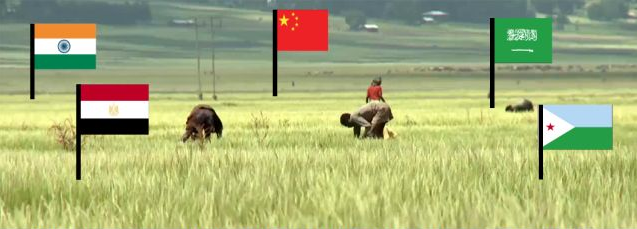November 24, 2009 at 6:14 am
In recent years, powerful and rich middle-east and Asian countries have been on a quest for the ultimate ‘breadbasket’ of grains to feed their growing population and to combat rising food prices.
These powerful and rich Asian countries have gone to poor African countries, such as Ethiopia, with corrupt governments to grab farmland for the purpose of growing grains there, and then exporting them to feed their own people. The poor African farmers lose their farmland to the “land grabbers” through coercion of the corrupt governments; the poor African farmers will then toil on the farmland day and night to only see the grains exported out elsewhere – little to none will be spared for domestic markets. As laborers on the farmland, they will be paid bare minimum wages under deplorable living standards.
Actually, such system of land management is not new to Ethiopia. Prior to the 1974 popular Ethiopian Revolution, which was later hijacked by a murderous military junta, land was exclusively owned by the nobility and other members of the few highly-privileged feudal landlords. Known as the Gebbar System – serfdom, everything that the farmer produced on the farm was the property of the feudal landlords, who would then redistribute grains to “their” farmers. The farmers (tenants) were totally under the control of the feudal landlord and would face eviction from the land if they failed to pay taxes in the form of farm products. The 1974 Revolution ended the Gebbar System after the landmark “Land to the Tiller” movement.
The “Land to the Tiller” movement was the major part of the Ethiopian Students Movement of the 1960’s and 1970’s – Oromo activists Baro Tumsa, Zegeye Asfaw and many others had played a central role in galvanizing the people for the land reform.
“Knowing that nobody could expect to win confidence in the prevailing political situation without solving the land issue to the satisfaction of the peasants, the ‘Derg’ (the military committee) scrapped the draft [Derg's version]. A group of radical young graduated students in the Ministry of Land Reform under the leadership of Zegeye Asfaw got the order to prepare a new draft”, which was later enacted into law on March 5, 1975; the law nationalized all land, and farmers started owning what were produced on their farms. (http://www.irsa-world.org/prior/XI/papers/4-8.pdf)
The land grab being orchestrated by TPLF is a Neo-Gebbar System with corrupt TPLF officials and the governments that own the fertile farmland in Ethiopia now becoming 21st-century feudal landlords subjecting poor peasants into a life of serfdom. Millions of hectares of fertile farmland have been offered to these powerful and rich Asian countries by TPLF under the disguise of “development.” Many UN organizations, such as FAO and WFP, have categorically refuted the claim that the foreign land grab would lead to development. (ftp://ftp.fao.org/docrep/fao/011/ak241e/ak241e.pdf)
The Washington Post has reported about the hottest commodity in the market: Ethiopia’s farmland – primarily farmland in the State of Oromia. Dr. Merera Gudina, leader of the main opposition coalition in Ethiopia – Medrek/FDD, said:
“We don’t trust this government. We are afraid this government is buying diplomatic support by giving away land.”
The Zenawi government is not just selling the farmland, but handing over a labor force of thousands of Ethiopians as slaves to the foreign-government-run farmland in their own home. Mafa Chipeta, FAO’s representative in Ethiopia, told the Washington Post:
“I can’t believe Ethiopia or any other government would allow their country to be used like an empty womb. The human spirit would not allow it.”
The lives of the farmers will not change; only their titles – from farmers to laborers. Governments that have poor human rights records in their home countries, such as China and Saudi Arabia, can not be expected to observe international labor laws in Ethiopia – a foreign land, where even the Zenawi government itself has no regard to international human rights laws and covenants. The “sweat shops” of Asia will now become the “sweat farms” of Ethiopia. A man the Washington Post interviewed said:
“We are not happy,” said the man, a farmer-turned-tractor driver who did not give his name because he feared being fired. “I’m a machine operator and I make 800 birr [about $65] a month. This is the most terrible pay.”
Besides all of these human calamities, environmental conditions will also get worse as these foreign-government-run farms excessively use chemicals to desperately increase productivity. Despite trying to pose as an environmentalist against the “West” at the Copenhagen Climate Summit, Prime Minister Meles Zenawi leads a government that has pillaged the environment in Ethiopia, particularly in the State of Oromia, from the deadly algae infestation in Lake Koka by tanneries to drying up of Lake Haramaya by TPLF-owned commercial khat farms and beer factory to the pollution of Akaki by soap and oil factories, among others (http://www.gadaa.com/Environment.html). Having no record of environmental stewardship, the government of Zenawi can not be trusted with shallow promises, such as the one Mr. Abera Deressa, Minister of State for Agriculture and Rural Development, has stated admitting that there is no Environment Code of Practice in Ethiopia yet; in other words, large- and small-scale farms (grains, flowers, etc) and factories continue to damage the environment with no regulation and control by the government.
“They cannot harm the environment. We are very clear on this. We in the Ministry of Agriculture are developing an environmental code of practice for the private sector. [...] We are also advising them not to cut trees, they have to manage soil erosion.” (http://www.ethiopianreview.com/content/11418)
Now is the time to restart the “Land to the Tiller!” chant.













